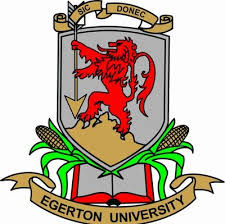The course is designed to meet the needs of analytical and industrial chemical laboratories in teaching, research, industrial chemical processes and quality control. The major fields of study shall include basic organic, inorganic and physical chemistry biochemical techniques, instrumental methods of analysis and general industrial processes.
The Department of Chemistryat Egerton University recognized the importance of technical training and launched a Certificate in Science Laboratory Programme. The Department of Chemistry has introduced Diploma in Modern Chemistry Laboratory Technology so as to address the national demand for quality-trained technicians. The programme aims to provide practical experience in modern analytical instrumentation and procedures, graded from basic equipment to the most up-to-date, microprocessor-controlled devices.
The programme also aims at enabling the certificates graduates of Egerton University and those from other institutions to competitively access higher education. At the end of the second year of study the students will go for field/industrial attachment. The field placement will be an opportunity for students to practice and develop the analytical skills through work.
